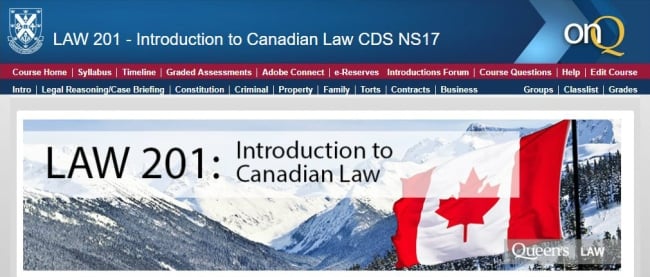You have /5 articles left.
Sign up for a free account or log in.

Queen's University
Institution: Queen’s University, Kingston, Ontario
Courses: LAW 201/701 Introduction to Canadian Law; LAW 202/702 Aboriginal Law; LAW 203/703 Introduction to Workplace Law; LAW 204/704 Corporate Law.
Curriculum: The seeds were planted three years ago with an introductory course on Canadian law. The blended course served undergraduate students who might benefit from some background in the field of law even if they were not aspiring to be lawyers.
Bill Flanagan, dean of the law faculty at Queen’s University, and his team intended the introductory course as an experiment, and it proved more popular than anyone at Queen’s could have imagined. Soon an online version was launched, and the institution transformed the face-to-face course into a blended format. During the past academic year, 1,100 students enrolled in the blended course and another 300 enrolled in the fully online version.
This past summer, Queen’s decided to further invest in law courses for undergraduates, creating a certificate program. Students who complete the program’s courses with a minimum GPA of 2.3 (which roughly translates to a C-plus in the United States) in each one and an overall GPA of 2.6 (a B-minus) earn a certificate.
Besides the intro course, there are specific online sessions in Aboriginal, corporate and workplace law. Several online sections were filled or near capacity.
Flanagan said his team chose those three topics because they could be applied to “a diverse array of career paths” for undergraduate students. Corporate law could be of interest to business students, while workplace law would entice those interested in human resources, and Aboriginal law has attracted attention from political science students.
“I think I was surprised at the level of interest in studying law,” he said. “I thought these courses would be winners, [but] they are smashing successes. That’s the only way to describe them.”
In addition to the online courses offered three times per year, blended versions of the introductory and corporate law courses are offered in the fall and winter semesters. The other two courses are only offered online, three times per year.
Target Audience: Thus far, the courses are aimed primarily at Queen’s students, but the university has hired a marketing firm to publicize the program more widely, according to Flanagan. He sees online enrollment from outside students as a potentially lucrative revenue source for the institution; all students will pay the same tuition, whether they attend Queen’s or another college. (Some Queen's students may be able to secure a slightly reduced cost for two of the four courses if they have room in their schedule for two elective credits, according to a university spokesperson.)
“We have discovered enormous thirst and interest to study law as part of [undergraduate] studies,” Flanagan said.
Kassia Regnier, a third-year undergraduate biology student at Queen’s, enrolled in the LAW 201 face-to-face course last year. She liked it so much that she’s embarked on the certificate track and said she now wants to pursue a law degree.
“I don’t know if I would have considered it without the opportunity to take all these law courses,” Regnier told “Inside Digital Learning.”
“It gave me much more confidence in my knowledge of law. I feel like I understand a lot more.”
Emma Douglas, also a third-year biology student, had a similar experience -- she also wants to pursue law rather than biology as a result of enrolling in the undergraduate online law courses. She had taken online courses before but expected the intro class to be challenging due to the nature of the material and self-pacing.
“The instructor was extremely engaged and passionate in the weekly videos he would post, and I was impressed with how smoothly the course went considering the [topic] was new to everyone,” Douglas said.
Challenges and Accomplishments: Some faculty members at the Queen’s law school, Flanagan admits, were skeptical about enrolling undergraduate students, which they feared would tarnish the institution’s reputation. They also were concerned that teaching online would likely outpace their technical abilities.
None of the faculty members are required to teach online courses -- the law institution instead reached out to outside subject-matter experts, distinguished alumni and postdoctorate students to serve as online instructors. A wider range of teaching personnel was available due to the flexibility of the online format, Flanagan said.
Now having seen the success of the early courses, many full-time instructors are willing to accept the certificate program as a viable part of the institution’s offerings, even though most of those skeptical originally still aren't teaching online, Flanagan said.
Losing the interpersonal interactions that come with face-to-face classes made delivering the courses online more difficult, Flanagan said. But open lines of email communication between instructors and students got close to making up for that shortcoming.
The online experiment didn’t unfold without a few mishaps, however. In one case, an exam bank made its way into the wrong database and was available to students when it shouldn’t have been.
“There’s always bumps in the road when things don’t work,” Flanagan said, adding that all of the issues were “pretty minor.” Success rates and feedback among students in the online courses were strong, Flanagan said. Since 2013, only 1 percent of nearly 2,600 students have failed LAW 201, and less than 0.5 percent have dropped out, according to Heather Cole, assistant dean of students at Queen’s.
What’s Next: Three more courses -- intellectual property law, public and constitutional law, and international law -- will debut next summer, bringing the certificate program’s total to seven. At the same time, Flanagan said, the institution is developing a fully online law degree program for juris doctor students.
Amid declining enrollments at North American law institutions over the last few years, Flanagan sees his institution’s experimentation as a possible path back to prosperity -- assuming other institutions follow suit. Thus far, he thinks, most appear not to have surmounted similar obstacles to those articulated by the law instructors at Queen’s. A few comparable examples exist in the U.S., though none with a certificate structure: Arizona State University offers a bachelor's degree in law, and Indiana University's law school has teamed up with its undergraduate academic schools to offer law courses.
“I think it’s kind of interesting that the penny hasn’t dropped that there’s a tremendous audience,” Flanagan said.








